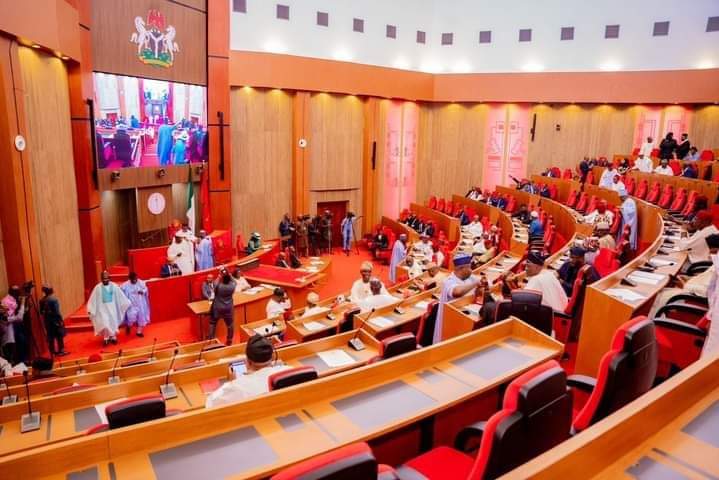The Nigerian Senate recently engaged in a heated debate over a motion to rename the Independent National Electoral Commission (INEC) headquarters after Professor Humphrey Nwosu, the former chairman of the defunct National Electoral Commission. Nwosu presided over the controversial June 12, 1993, presidential election, widely considered the freest and fairest in Nigeria’s history, but which was tragically annulled by the then military dictator, General Ibrahim Babangida. The motion, reintroduced by Senator Enyinnaya Abaribe, sought not only to rename the INEC headquarters but also to confer posthumous national honors on Nwosu, recognizing his contribution to Nigeria’s democratic development. This proposal, however, sparked a contentious divide amongst the senators, highlighting the complex and often conflicting interpretations of Nwosu’s role in the pivotal June 12 election.
At the heart of the debate was the question of Nwosu’s culpability in the annulment. While some senators argued that Nwosu operated under immense pressure from the military regime, effectively having a “gun to his head,” others maintained that his failure to announce the results, regardless of the circumstances, disqualified him from national recognition. Senator Osita Ngwu acknowledged the constraints placed upon Nwosu by the military regime, asserting that his inability to announce the results shouldn’t diminish his contributions to the electoral process. Conversely, Senator Jimoh Ibrahim vehemently opposed the motion, questioning the rationale behind honouring someone who, in his view, failed to fulfill his primary duty. This divergence in perspectives underscores the enduring controversy surrounding the June 12 election and its key players.
Supporting the motion, Senator Austin Akobundu considered it unjust to dismiss Nwosu’s contributions, arguing that he deserved a place in Nigeria’s hall of honour. He emphasized the need to consider the context within which Nwosu operated, highlighting the immense pressure and threats he faced from the military junta. For Akobundu and those who shared his view, honoring Nwosu would be an acknowledgment of his courage in conducting a free and fair election despite the oppressive environment. However, this sentiment was countered by senators like Senator Cyril Fasuyi, who believed that history judges individuals based on results, not efforts. He argued that regardless of the circumstances, Nwosu’s failure to announce the results negated any positive contributions he might have made.
Adding another layer to the debate was the concern that honouring Nwosu could inadvertently overshadow the legacy of Chief MKO Abiola, the presumed winner of the annulled election. Senator Afolabi Salisu cautioned that immortalizing Nwosu would be tantamount to diminishing Abiola’s sacrifice and undermining the struggle for democracy that June 12 represents. He argued that anything beyond a minute of silence for Nwosu would be a disservice to Abiola’s memory and the democratic ideals he embodied. This perspective underscored the sensitivities surrounding the June 12 annulment and the enduring reverence for Abiola as a symbol of democracy.
Senator Sunday Karimi criticized Nwosu for his perceived lack of courage to defy the military and announce the results, suggesting that a true hero would have stood firm against the pressure. This view reflected a sentiment among some senators that Nwosu should have risked his personal safety to uphold the integrity of the election. The debate also highlighted the complexities of evaluating historical figures, particularly those operating under authoritarian regimes. While some emphasized the importance of considering the constraints faced by individuals in such situations, others maintained that certain principles, like upholding the results of a democratic election, should transcend even the most oppressive circumstances.
Ultimately, the motion to rename the INEC headquarters after Nwosu and confer him with posthumous national honours was defeated by a majority voice vote in the Senate. While acknowledging the contentious nature of the issue, the senators agreed to honour Nwosu with a one-minute silence and extend condolences to his family. This decision reflects the Senate’s attempt to navigate the complex legacy of the June 12 election, recognizing Nwosu’s contribution while simultaneously avoiding any action perceived as diminishing Abiola’s sacrifice or condoning the annulment. The debate, however, underscores the enduring divisions and unresolved questions surrounding this pivotal moment in Nigeria’s democratic history.














